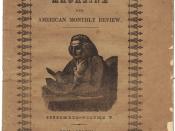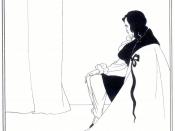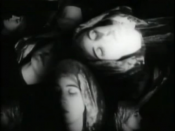Love and Death in the Tales of Poe
Upon hearing the name "Edgar Allan Poe," most people think of macabre tales containing suspense and terror. These are not the only types of stories Poe has written. One of his best-known horror stories "The Fall of the House of Usher" is also a story of love. Love is an important and meaningful element in romantic stories. Throughout his tales, Poe uses the relationship of love between two people not only to expand the story, but also to incite fear and foreshadow death.
According to Oscar Wilde, "each man kills the thing he loves" ("Ballad" 25). Poe seems to embrace this theory in his story "Eleonora." The narrator of the tale is in love with his cousin Eleonora and makes a vow that he will never love another woman and "would in no manner prove recreant to her dear memory" (Poe, "Eleonora" 197).
When the speaker proclaims his love for Eleonora, she realizes that she is close to death and does not have much time to live. "[I]n Poe, love is a purely frictional, destructive force" (Lawrence 2), and he uses it with death: two themes that are not commonly found together in that era.
The story of "Ligeia" is also about a man having so much adoration for the woman he loves that she dies. In fact, the narrator subconsciously realizes this destiny about his lover, stating, "I saw that she must die" (Poe, "Ligeia" 67). Clearly, being a heroine in one of Poe's short stories means dying at a young age. Although there are some horror elements within the tales, "'Ligeia' and 'The Fall of the House of Usher' are really love stories" (Lawrence 377). In "The Fall of the House of Usher," Poe uses the love between Roderick and...


